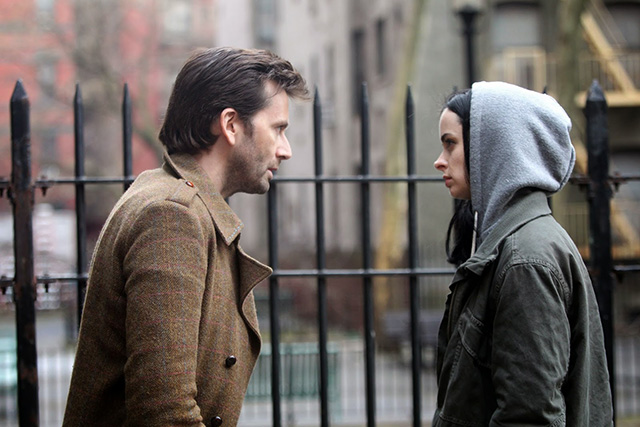Better ‘Jessica Jones’ Title – ‘AKA Trigger Warning’ or ‘Alias: Plot Holes’

I know that I strongly recommended watching the Netflix show Jessica Jones, based on the first three episodes. That recommendation is tempered by two important things now that I have seen it all. First, the show is an enormous smorgasbord of abuse, presented with such intensity that it is something that should seriously carry a trigger warning in front of each episode. Second, the show has a serious plot hole that starts small, but by two-thirds through the series becomes so large that you have to completely suspend all belief in logical actions of the characters.
Almost all of the abuse can be laid at the feet of the main villain, and I will have to explain why, so some spoiler alerts are required. And the plot hole will require serious spoilers, so: SPOILER WARNING.
[divider]
The main villain is Kevin Kilgrave, who started his comic book career in the 1960s as Zebediah Killgrave, a low-rent enemy of Daredevil with the cheesy name The Purple Man. In Jessica Jones, David Tenant plays him to creepy perfection, but without the purple skin of the comic book version (he does rock some great purple suits, so his penchant for the color of royalty holds true).
The awful implications of his verbal mind control abilities aren’t explored in depth until he is important to an Alpha Flight story line in the 1980s, when it is revealed he raped, via forcing her compliance for sex, the mother of the character Purple Girl (aka Persuasion). In Jessica Jones, he is as horrifying as he was portrayed by Brian Michael Bendis in the comic book Alias, on which the show is based.
That is why I say this show needs serious trigger warnings. Imagine, if you or a friend is a victim of rape or a controlling, abusive relationship, and you watch a show in which the main character can roofie people with just a command. That’s Kilgrave in a nutshell. And he isn’t the only one who commits abuse — there is parental abuse by the mother of one of the main characters and by Kilgrave’s parents via flashback, abusive relationships abounding, even alcohol abuse by the main character. There is pregnancy by rape, attempted abortion by violent beating and abortion by self-medication.
To be fair, the abuse happens mostly off screen and is mentioned in flashback. But there is nothing more horrifying to a victim than the idea of someone who has the ability to force a victim to do anything — and while under control, actually want to do whatever horrible thing they are commanded to do.
My second big issue with the story is how to deal with Kilgrave. At the beginning, it makes sense that Jessica can’t just kill Kilgrave. He made a college girl commit a horrible murder right in front of Jessica to torture her, and the girl is arrested for it and likely will face life in prison unless Jessica can prove that someone can control people and did so with the college girl. Of course, the NYPD has experienced something like that already with Loki, since this is set after the events of the first Avengers movie, but it isn’t a great stretch to believe they need direct evidence.
However, Kilgrave’s victims don’t forget what he made them do. In fact, that is part of his psychopathic enjoyment of what he can do — that they are tormented by the memories of his actions. At one point he confronts Jessica in a police precinct and is controlling all of the cops so that they will kill each other at his command. He never mentions any kind of kill switch effect — that they would kill each other if he dies. So at that point Jessica could have just ripped his head off (he gets close enough) and the cops, when the effect wore off, would remember that they had been controlled. A room full of the best eyewitnesses you can put on a stand.
Worse, once she realizes Kilgrave can’t control her anymore, all Jessica needed to do was use her super strength to drive her finger into his throat under his voicebox, in a fast and dirty version of a tracheotomy. No voice, no control. Done. And trust me, she had ample opportunity to do so, and at one point the writing gets so bad they have to resort to the cheap trick of a type of mob attack with one character doing something so stupid as to defy all belief to get Kilgrave out of a situation in which Jessica had him completely under her control. That’s the second time — the first she has him under her, the way he gets out actually makes sense and is written very well.
The concept that she also can’t just end Kilgrave because she is a “hero” at heart, which is presented as the logical reason to not kill him get more and more thin, just doesn’t hold water. Jessica uses just about everyone she knows to get her way with a complete lack of conscience, so saving them by killing seems like not even a smidgen of a stretch.
Plus, the series often resorts to using the worst way to drive drama in a superhero story — the character not using their powers at an obvious point in the plot.
I can almost buy the origin story shows like Flash or Supergirl getting away with being too stupid to use your own powers properly, but Jessica Jones is a jaded veteran with real hero team experience. Having a superhero character not think to use his or her powers as a way to drive the drama on a show is a cheap trick and a classic example of bad writing. This happens repeatedly in the later episodes.
So, the upshot is, the character moments in this show are still amazing. The casting is excellent, the fights are spectacular, and the Marvel references, nods and Easter Eggs alone are worth watching Jessica Jones, even if you have to hold your nose on occasion because of the writing — assuming you are confident you can handle the amazing amounts and variety of abuse.



